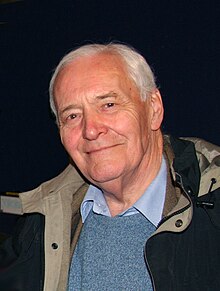
Back توني بين Arabic تونى بين ARZ টনি বেন Bengali/Bangla Tony Benn Breton Tony Benn Czech Tony Benn Welsh Tony Benn Danish Tony Benn German Τόνι Μπεν Greek Tony Benn Esperanto
Tony Benn | |||||||||||||||||||||||||||||||||||||
|---|---|---|---|---|---|---|---|---|---|---|---|---|---|---|---|---|---|---|---|---|---|---|---|---|---|---|---|---|---|---|---|---|---|---|---|---|---|
 Benn in 2006 | |||||||||||||||||||||||||||||||||||||
| Secretary of State for Energy | |||||||||||||||||||||||||||||||||||||
| In office 10 June 1975 – 4 May 1979 | |||||||||||||||||||||||||||||||||||||
| Prime Minister | |||||||||||||||||||||||||||||||||||||
| Preceded by | Eric Varley | ||||||||||||||||||||||||||||||||||||
| Succeeded by | David Howell | ||||||||||||||||||||||||||||||||||||
| Secretary of State for Industry | |||||||||||||||||||||||||||||||||||||
| In office 5 March 1974 – 10 June 1975 | |||||||||||||||||||||||||||||||||||||
| Prime Minister | Harold Wilson | ||||||||||||||||||||||||||||||||||||
| Preceded by | Peter Walker (Trade and Industry) | ||||||||||||||||||||||||||||||||||||
| Succeeded by | Eric Varley | ||||||||||||||||||||||||||||||||||||
| Chairman of the National Executive Committee of the Labour Party | |||||||||||||||||||||||||||||||||||||
| In office 20 September 1971 – 25 September 1972 | |||||||||||||||||||||||||||||||||||||
| Leader | Harold Wilson | ||||||||||||||||||||||||||||||||||||
| Preceded by | Ian Mikardo | ||||||||||||||||||||||||||||||||||||
| Succeeded by | William Simpson | ||||||||||||||||||||||||||||||||||||
| Minister of Technology | |||||||||||||||||||||||||||||||||||||
| In office 4 July 1966 – 19 June 1970 | |||||||||||||||||||||||||||||||||||||
| Prime Minister | Harold Wilson | ||||||||||||||||||||||||||||||||||||
| Preceded by | Frank Cousins | ||||||||||||||||||||||||||||||||||||
| Succeeded by | Geoffrey Rippon | ||||||||||||||||||||||||||||||||||||
| Postmaster General | |||||||||||||||||||||||||||||||||||||
| In office 15 October 1964 – 4 July 1966 | |||||||||||||||||||||||||||||||||||||
| Prime Minister | Harold Wilson | ||||||||||||||||||||||||||||||||||||
| Preceded by | Reginald Bevins | ||||||||||||||||||||||||||||||||||||
| Succeeded by | Edward Short | ||||||||||||||||||||||||||||||||||||
| |||||||||||||||||||||||||||||||||||||
| President of the Stop the War Coalition | |||||||||||||||||||||||||||||||||||||
| In office 21 September 2001 – 14 March 2014 | |||||||||||||||||||||||||||||||||||||
| Vice President | Lindsey German | ||||||||||||||||||||||||||||||||||||
| Chairman | |||||||||||||||||||||||||||||||||||||
| Preceded by | Position established | ||||||||||||||||||||||||||||||||||||
| Succeeded by | Brian Eno | ||||||||||||||||||||||||||||||||||||
| Personal details | |||||||||||||||||||||||||||||||||||||
| Born | Anthony Neil Wedgwood Benn 3 April 1925 London, England | ||||||||||||||||||||||||||||||||||||
| Died | 14 March 2014 (aged 88) London, England | ||||||||||||||||||||||||||||||||||||
| Political party | Labour | ||||||||||||||||||||||||||||||||||||
| Other political affiliations | Socialist Campaign Group[1] | ||||||||||||||||||||||||||||||||||||
| Spouse | |||||||||||||||||||||||||||||||||||||
| Children | 4, including Stephen, Hilary and Melissa | ||||||||||||||||||||||||||||||||||||
| Parents |
| ||||||||||||||||||||||||||||||||||||
| Relatives | Emily Benn (granddaughter) | ||||||||||||||||||||||||||||||||||||
| Education | Westminster School | ||||||||||||||||||||||||||||||||||||
| Alma mater | New College, Oxford | ||||||||||||||||||||||||||||||||||||
| Signature | |||||||||||||||||||||||||||||||||||||
| Military service | |||||||||||||||||||||||||||||||||||||
| Allegiance | United Kingdom | ||||||||||||||||||||||||||||||||||||
| Branch/service | Royal Air Force | ||||||||||||||||||||||||||||||||||||
| Rank | Pilot officer | ||||||||||||||||||||||||||||||||||||
| Battles/wars | World War II | ||||||||||||||||||||||||||||||||||||
Anthony Neil Wedgwood Benn (3 April 1925 – 14 March 2014), known between 1960 and 1963 as The Viscount Stansgate, was a British Labour Party politician and political activist who served as a Cabinet minister in the 1960s and 1970s. He was the Member of Parliament for Bristol South East and Chesterfield for 47 of the 51 years between 1950 and 2001. He later served as President of the Stop the War Coalition from 2001 to 2014.
The son of a Liberal and later Labour Party politician, Benn was born in Westminster and privately educated at Westminster School. He was elected for Bristol South East at the 1950 general election but inherited his father's peerage on his death, which prevented him from continuing to serve as an MP. He fought to remain in the House of Commons and campaigned for the ability to renounce the title, a campaign which eventually succeeded with the Peerage Act 1963. He was an active member of the Fabian Society and served as chairman from 1964 to 1965. He served in Harold Wilson's Labour government, first as Postmaster General, where he oversaw the opening of the Post Office Tower, and later as Minister of Technology.
Benn served as Chairman of the National Executive Committee from 1971 to 1972 while in Opposition. In the Labour government of 1974–1979, he returned to the Cabinet as Secretary of State for Industry and subsequently served as Secretary of State for Energy. He retained that post when James Callaghan succeeded Wilson as Prime Minister. When the Labour Party was in opposition through the 1980s, he emerged as a prominent figure on the left wing of the party and unsuccessfully challenged Neil Kinnock for the Labour leadership in 1988. After leaving Parliament at the 2001 general election, Benn was President of the Stop the War Coalition until his death in 2014.
Benn was widely seen as a key proponent of democratic socialism and Christian socialism, though in regards to the latter he supported the United Kingdom becoming a secular state and ending the Church of England's status as an official church of the United Kingdom.[2][3] Originally considered a moderate within the party, he was identified as belonging to its left wing after leaving ministerial office. The terms Bennism and Bennite came into usage to describe the left-wing politics he espoused from the late 1970s and its adherents. He was an influence on the political views of Jeremy Corbyn, who was elected Leader of the Labour Party a year after Benn's death, and John McDonnell, who served as Shadow Chancellor of the Exchequer under Corbyn.
- ^ Seyd, Patrick (1987). The Rise and Fall of the Labour Left. Macmillan Education. p. 165. ISBN 978-0-333-44748-2.
- ^ White, Michael (14 March 2014). "Tony Benn: the establishment insider turned leftwing outsider". The Guardian. Retrieved 22 September 2022.
- ^ Rush, Martyn (26 February 2021). "Tony Benn's Plan to Democratise Britain – and Abolish the Monarchy". Tribune. Retrieved 22 September 2022.